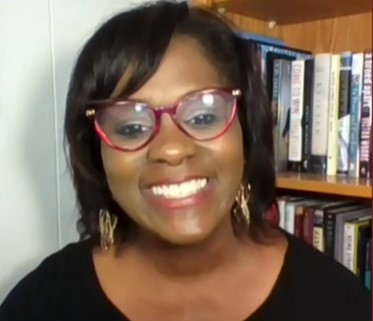Rethinking Universal Service, Putting Responsibility on Platform Firms Should Become Top Agenda Objectives, Says Brookings’ Turner-Lee
Urges ‘no child left offline,’ digital ‘solutions’ (rather than ‘divide’) at Media Institute session

The smarter way to stay on top of the multichannel video marketplace. Sign up below.
You are now subscribed
Your newsletter sign-up was successful
“We need to go back to the drawing board on Universal Service,” Dr. Nicole Turner-Lee of the Brookings Institution urged policymakers today (October 27), stressing that the value of guaranteed telecommunications access should be based on applications “not just infrastructure.” She singled out objectives such as “No child left offline” as a way to re-evaluate the goal of the Universal Service agenda, adding that broadband access should be viewed in terms of issues such as food or housing insecurity.
“We have failed at Universal Service in cases of need,” she said. “We have to migrate money in the U.S. budget to show that broadband is critical to the delivery of education, health” and other vital services, Turner-Lee told the Media Institute’s monthly “luncheon,” now a virtual presentation for Washington telecom and media executives.
Turner-Lee, who is also director of the Center of Technology Innovation at the Brookings think tank, suggested that current pandemic offers a good time for government and institutions to examine the role of platform companies, including whether – or more specifically how – they should be involved in the new Universal Service program, given their expanding role in providing access to applications. She acknowledged the potential dangers that could arise from the massive amount of data that the platform companies collect and keep about individuals, citing differential treatment on issues such as housing or health care based on that data.
Although she did not suggest a specific plan for extracting funding from platform companies, she indicated that policymakers should consider such revenue sources.
“Digital Solutions”
Throughout her Washington career, Turner-Lee has focused on “digital divide” problems, but she told the Media Institute audience that the pandemic has demonstrated that the digital divide is “not binary and is more complicated than we actually thought.” She urged that the examination be focused on urban/rural “solutions” rather than “divides.”
“We need to think radically and push harder for the kind of economic data that will help us make decisions, such as what technology will work” to solve those challenges, she said.
The smarter way to stay on top of the multichannel video marketplace. Sign up below.
Touting her upcoming book Digitally Invisible: How the Internet is Creating the New Underclass (Brookings Press, 2021), Turner-Lee cited her research about the pandemic’s effect on education. She pointed out that underprivileged adults who need a computer for telework are often using the laptops issued to their school-age children for school work.
She also presented preliminary recommendations for a “Technology New Deal,” that will include policies for infrastructure and applications plus input from other community sectors, including banks, retailers and other organizations and groups affected by the impact of unserved and underserved broadband areas.
“We’ve got to rethink what it looks like, including who else has to be added to the ecosystem,” she said, urging that the list of topics should include affordability and a technology plan.
Although Turner-Lee’s presentation was not billed as an official political roadmap for the 2021 Congress and White House, Brookings – like other think tanks - typically rollout policy sessions in during late November and December in preparation for the post-election process. She steered away from specific policy proposals, but in response to a question about what kind of support is needed to implement the ideas she had described, Turner-Lee uttered a single word: “bipartisan.”
Contributor Gary Arlen is known for his insights into the convergence of media, telecom, content and technology. Gary was founder/editor/publisher of Interactivity Report, TeleServices Report and other influential newsletters; he was the longtime “curmudgeon” columnist for Multichannel News as well as a regular contributor to AdMap, Washington Technology and Telecommunications Reports. He writes regularly about trends and media/marketing for the Consumer Technology Association's i3 magazine plus several blogs. Gary has taught media-focused courses on the adjunct faculties at George Mason University and American University and has guest-lectured at MIT, Harvard, UCLA, University of Southern California and Northwestern University and at countless media, marketing and technology industry events. As President of Arlen Communications LLC, he has provided analyses about the development of applications and services for entertainment, marketing and e-commerce.

